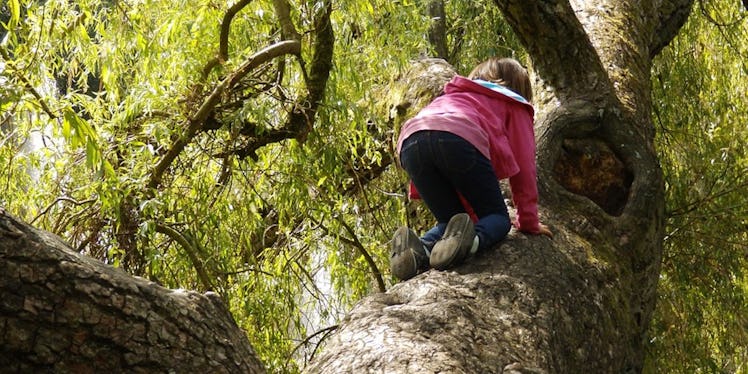How should I react if my child trips and falls?
Plus the most dangerous place he ever took them.

The following was syndicated from Quora for The Fatherly Forum, a community of parents and influencers with insights about work, family, and life. If you’d like to join the Forum, drop us a line at TheForum@Fatherly.com.
How should I react if my child trips and falls?
My wife and I decided that we would let our children hurt themselves, but would not let them damage themselves.
If they fall and hurt themselves, but draw no blood, then we comment on their fall, but don’t make a fuss. Did you hurt yourself? Oh, that makes me sad. How does it feel? Can you get up? Do you want help?
RELATED: Ways Parents Accidentally Injure Their Children
Flickr / Jaro Larnos
Of course, if they broke the skin I’d take them home to put some antibiotic on it, and a pretty bandaid. I’d tell my wife, in front of my daughter, “She fell and hurt her knee. She was very brave.”
I recall one time when I was at a party at Codonices Park in Berkeley, and there was a magnificent climbing tree. At least my 7-year-old daughter thought so, and she had great fun climbing it. No other children at the party (there were about 5 others) were allowed up by their parents. One of the mothers came over to me and said, “Why do you let her do that? It’s very dangerous.”
I replied, “There’s soft grass under the tree. If she falls, she probably won’t do any more than break an arm.” The mother seemed horrified.
In fact, my daughter broke her arm only once, actually only her wrist, on a ski trip, and not in a place that you would have thought so dangerous: getting off a ski lift.
Pixabay
A few years later we took our children to La Mer de Glace, the great glacier up in the Alps outside of Chamonix. It was, perhaps, the most intrinsically dangerous place we ever took our family, a huge ice flow full of cracks and openings. We let them wander, but I made sure I was always close enough to grab them if they wandered too close to a crevasse.
I was amazed at how careful both of my children were. They would see a crevasse, and then approach cautiously, get down on their bellies, and inch up to it. They knew how to be careful. I assume that’s because they had hurt themselves in the past and could recognize danger.
We always felt it important to teach our children that it is okay to take calculated risks. Now the girl walking across the crevasse is an adult, and the executive director and co-founder of our non-profit research organization Berkeley Earth.
Richard Muller is a professor of physics at UC Berkeley and the author of “Energy For Future Presidents.” You can read more from Quora here:
This article was originally published on